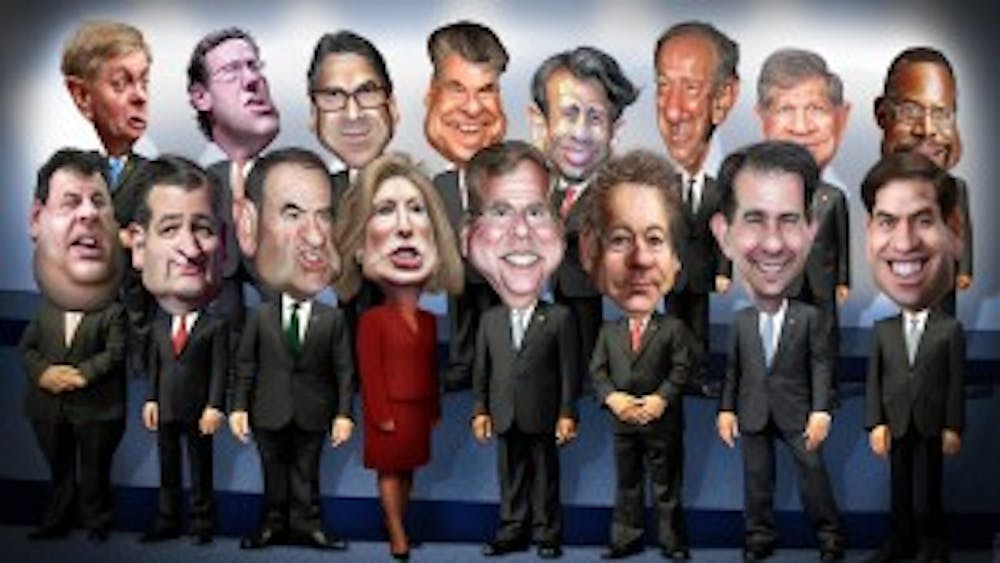
So just what are Libertarian principles? In very broad terms, libertarians want maximum freedom with minimum government both in business and personal affairs.
In the political spectrum, this generally translates to support for fiscal conservatism (lower taxes, less government regulation of businesses) and social liberalism (support for marriage equality, decriminalization of marijuana). As with any political philosophy, libertarianism is a spectrum, but the Libertarian Party’s platform represents the moderate wing, so that will serve as our rubric.
So where do the current frontrunners stack up?
Economic Issues
Economic policy is probably the easiest to evaluate and the category in which the most candidates are likely to agree. All of the primary candidates support lower taxes and cutting government spending, which are practically prerequisites for running as a Republican.
Most of the candidates support balancing the federal budget; some, such as Ted Cruz, Scott Walker and Marco Rubio, have voiced support for a constitutional amendment requiring it. Cruz, Rand Paul and Ben Carson want to move toward a flat tax and the elimination of the Internal Revenue Service (IRS), while Carly Fiorina and Donald Trump have advocated for simplifying the tax code and reducing the individual rate.
John Kasich favors shifting to a consumption-based tax rather than an income tax. He and Jeb Bush are the only two major candidates who would consider higher tax rates for specific goals — in Kasich’s case, a state tax on fracking and in Bush’s, a compromise to pass spending cuts — though Trump has proposed a one-time tax on the wealthy to help pay off the national debt.
Libertarians support the repeal of the income tax, a balanced budget amendment and the abolishment of the IRS. Based on those criteria, Cruz, Walker and Rubio are doing well. Paul and Carson’s opposition to the IRS would make them popular among libertarians but their support of a flat tax rather than a repeal of income taxes would damage them. In this regard, Kasich has an advantage whereas Carly Fiorina and Jeb Bush flounder across the board.
Social Issues
In terms of social issues, there is a much wider array of opinions. Marijuana legalization provokes a variety of responses.
Many candidates, including Walker, Cruz and Bush, seem to support a states’ rights approach, meaning that although none of them are personally in favor of legalization, they would prefer the states decide rather than passing down a mandate from the federal government.
Carson and Trump are in favor of legalizing medical marijuana but are skeptical of legalization for recreational use. Rubio stands out for his opposition to legalization, while Paul is an outlier on the other side: He supports full legalization for both medical and recreational use.
Kasich occupies a bit of an odd position, agreeing with Rubio about legalization but falling closer to Paul regarding punishment — both would like to reduce sentences for nonviolent offenders, among other criminal justice reforms.
Based on this issue alone Walker, Cruz and Bush stand out, with Paul coming out farthest ahead. Anyone wishing to continue the “War on Drugs” will find it difficult to garner support among legalization-minded libertarians, though Kasich may earn points for his focus on rehabilitation rather than punishment.
Foreign Policy
Foreign policy produces variety as well, even in one candidate as is the case with Rand Paul. Though he follows his libertarian principles with regards to foreign aid and diplomacy (limit the first and rely more heavily on the latter), he does support increasing the defense budget.
Cruz likewise supports restraint in foreign relations along with Fiorina, Bush and Trump. Walker, Carson, Rubio and Kasich are more hawkish, willing to put boots on the ground to combat ISIS.
Libertarians are generally anti-interventionist, opposed to any American involvement in conflicts that do not directly threaten the country’s citizens or vital interests. Based on the candidates’ view on how to handle ISIS, Paul and Cruz come out on top.
Overall, there is no clear libertarian favorite. Paul does his best to cater to his libertarian base, but some of his positions fall flat. Walker and Rubio also do well, but their hawkish foreign policy tendencies are worrisome to most noninterventionists. Kasich has some room to grow with libertarians and though many of his policies conflict with their views, he might be able to win over enough libertarian Republicans to do well in the primaries.
In the end, it will come down to priorities among voters. And as the field narrows, it’ll hopefully get easier to judge.

















